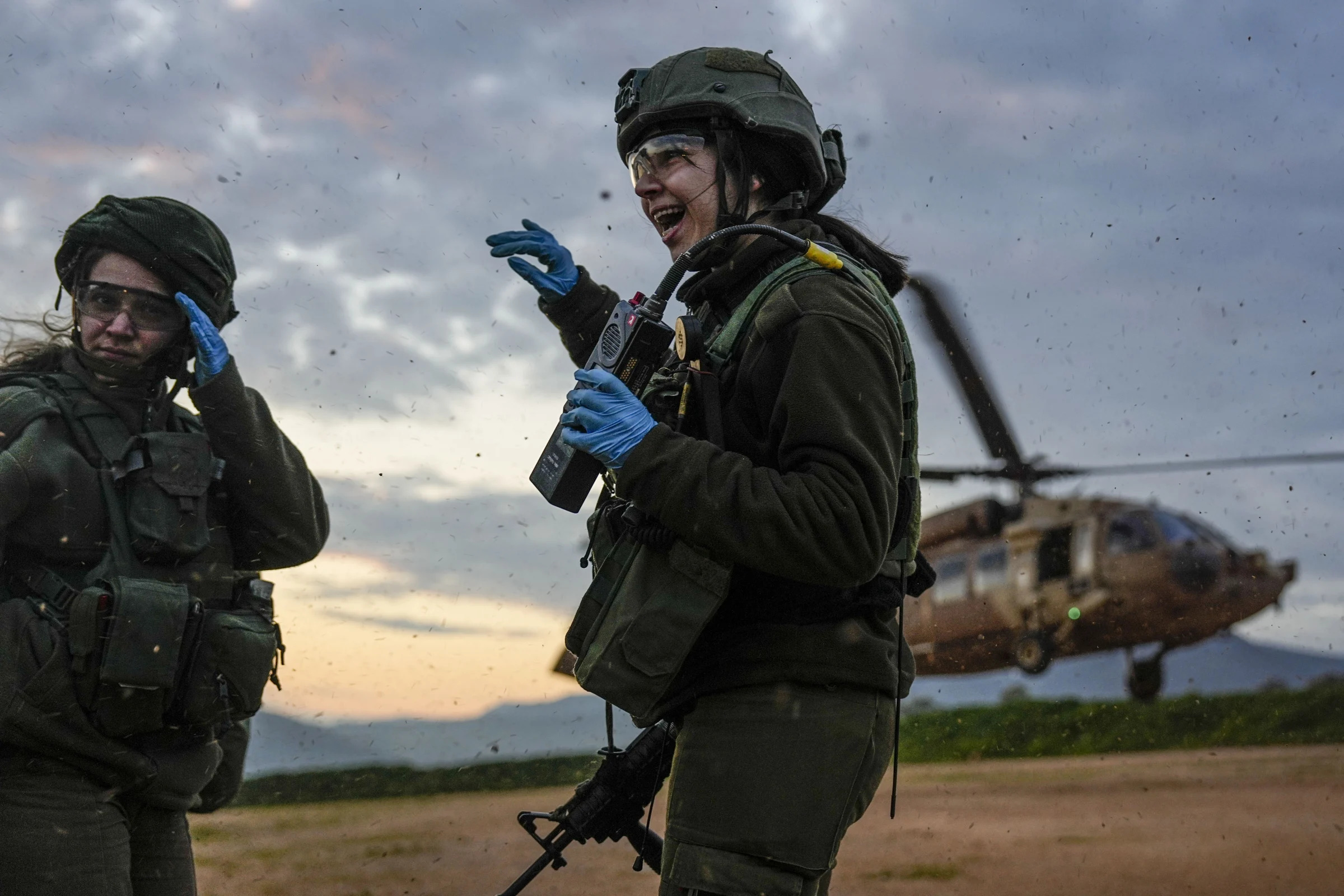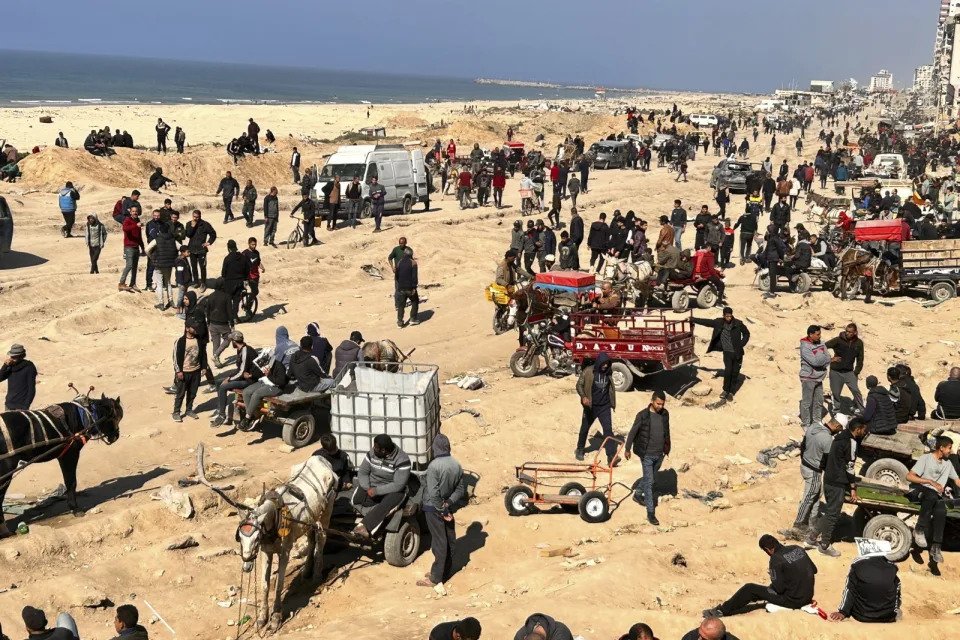Israel vows to target Lebanon's Hezbollah even if cease-fire reached with Hamas in Gaza

Israel’s defense minister vowed Sunday to step up attacks on Lebanon’s Hezbollah militant group even if a cease-fire is reached with Hamas in the Gaza Strip.
Israeli female paramedic soldiers take cover from the wind made by a landing military helicopter during an exercise simulating evacuation of wounded people in northern Israel, near the border with Lebanon,
Hezbollah, which has been exchanging fire with Israel throughout the war in Gaza, has said it will halt its nearly daily attacks on Israel if a cease-fire is reached in Gaza.
But Israeli Defense Minister Yoav Gallant said that anyone who thinks a temporary cease-fire for Gaza will also apply to the northern front is “mistaken.”
“We will continue the fire, and we will do so independently from the south, until we achieve our goals,” Gallant said. He said there is a simple aim: to push Hezbollah away from the Israeli border, either through a diplomatic agreement or by force.
Hezbollah began striking Israel almost immediately after Hamas triggered the fighting in Gaza with a deadly attack along Israel’s southern border from the Gaza Strip on Oct. 7. Tens of thousands of civilians on both sides of the Israel-Lebanon border have been displaced by the continued cycle of Hezbollah rocket and missile attacks and Israeli airstrikes and artillery fire.
Hezbollah leader Hassan Nasrallah said in a speech earlier this month that the group would adhere to a cease-fire in southern Lebanon if a cease-fire should be reached in Gaza. But he said it would resume and escalate attacks if Israel continued to strike in Lebanon after any agreement with Hamas.
A Lebanese security official said Sunday that five Hezbollah members were killed in two separate Israeli airstrikes on trucks in the border area between Lebanon and Syria. The official spoke on condition of anonymity because he was not authorized to share the information with journalists. Hezbollah announced that three of its fighters had been killed, but did not say where.
The Israeli military did not acknowledge the strikes on the Lebanon-Syria border but announced that it had struck several sites in southern Lebanon in response to missile launches and that it targeted a “terrorist cell” in the town of Blida.
Gallant said Israel’s targeting of Hezbollah commanders has significantly weakened the group's ability to attack Israel.
About 200 Hezbollah fighters and 35 civilians in Lebanon have been killed in nearly five months of daily low-level clashes between the Lebanese militant group and Israeli forces against the backdrop of the Israel’s war with Hamas, a Hezbollah ally. In Israel, nine soldiers and nine civilians have been killed in Hezbollah attacks.
Most of the fighting between Hezbollah and Israel has been confined to the area within a few kilometers on either side of the border.
Diplomats from the United States and European countries have presented a series of proposals in hopes of producing a deal that would tamp down the border conflict.
The ideas mostly hinge on a Hezbollah pullback a few kilometers from the border, a beefed-up Lebanese army presence in the border region, and negotiations over border points where Lebanon maintains Israel has been occupying small areas of Lebanese territory since withdrawing its forces from the rest of southern Lebanon in 2000.
Eventually, the plans could lead into a demarcation of the land border between Lebanon and Israel, following the maritime border deal reached in 2022.
The most recent of these proposals, put forward by France, would involve Hezbollah withdrawing its forces 10 kilometers (6 miles) from the border, said a Lebanese government official who spoke on condition of anonymity because they were not authorized to discuss the negotiations.
Lebanon is still studying the proposal, and Hezbollah officials have indicated they are willing to consider it, but both government and Hezbollah officials have said there would be no agreement on the border before there is a cease-fire in Gaza.
Netanyahu says a cease-fire deal would only delay 'somewhat' an Israeli military offensive in Rafah
Palestinians wait for humanitarian aid on a beachfront in Gaza City, Gaza Strip, Sunday, Feb. 25, 2024
An Israeli military offensive in Gaza's southernmost city of Rafah could be “delayed somewhat” if a deal is reached for a weekslong cease-fire between Israel and Hamas, Prime Minister Benjamin Netanyahu said Sunday, and claimed that total victory in the territory would come within weeks once the offensive begins.
Netanyahu confirmed to CBS that a deal is in the works, with no details. Talks resumed Sunday in Qatar at the specialist level, Egypt’s state-run Al Qahera TV reported, citing an Egyptian official as saying discussions would follow in Cairo with the aim of achieving the cease-fire and release of dozens of hostages held in Gaza as well as Palestinians imprisoned by Israel.
Meanwhile, Israel is nearing the approval of plans to expand its offensive against the Hamas militant group to Rafah on the Gaza-Egypt border, where more than half the besieged territory's population of 2.3 million have sought refuge. Humanitarian groups warn of a catastrophe. Rafah is Gaza's main entry point for aid. The U.S. and other allies say Israel must avoid harming civilians.
Netanyahu has said he will convene the Cabinet this week to approve operational plans that include the evacuation of civilians to elsewhere in Gaza.
“Once we begin the Rafah operation, the intense phase of the fighting is weeks away from completion. Not months," Netanyahu told CBS. ““If we don’t have a deal, we’ll do it anyway.” He said four of the six remaining Hamas battalions are concentrated in Rafah.
U.S. national security adviser Jake Sullivan told NBC that President Joe Biden hadn't been briefed on the Rafah plan. “We believe that this operation should not go forward until or unless we see (a plan to protect civilians),” Sullivan said.
Early Monday, Netanyahu’s office said the army had presented to the War Cabinet its “operational plan” for Rafah as well as plans to evacuate civilians from the battle zones. It gave no further details.
His office also said the War Cabinet had approved a plan to deliver humanitarian aid safely into Gaza.
United Nations agencies and aid groups say the hostilities, the Israeli military’s refusal to facilitate deliveries and the breakdown of order inside Gaza make it increasingly difficult to get vital aid to much of the coastal enclave. In some chaotic scenes, crowds of desperate Palestinians have surrounded delivery trucks and stolen the supplies off them.
Heavy fighting continued in parts of northern Gaza, the first target of the offensive, where the destruction is staggering.
“We’re trapped, unable to move because of the heavy bombardment," said Gaza City resident Ayman Abu Awad.
He said that starving residents have been forced to eat animal fodder and search for food in demolished buildings. In nearby Jabaliya, market vendor Um Ayad showed off a leafy weed that people pick from the harsh, dry soil and eat.
“We have to feed the children. They keep screaming they want food. We cannot find food. We don’t know what to do,” she said.
Philippe Lazzarini, commissioner general of the U.N. agency for Palestinians, said it has not been able to deliver food to northern Gaza since Jan. 23, adding on X, formerly Twitter, that “our calls to send food aid have been denied."
Israel said that 245 trucks of aid entered Gaza on Sunday — less than half the amount that entered daily before the war.
DETAILS OF THE PROPOSED DEAL
A senior official from Egypt, which along with Qatar is a mediator between Israel and Hamas, has said the draft cease-fire deal includes the release of up to 40 women and older hostages in return for up to 300 Palestinian prisoners, mostly women, minors and older people.
The official, speaking on condition of anonymity to discuss the negotiations, said the proposed six-week pause in fighting would include allowing hundreds of trucks to bring desperately needed aid into Gaza every day, including the north. He said both sides agreed to continue negotiations during the pause for further releases and a permanent cease-fire.
Negotiators face an unofficial deadline of the start of the Muslim holy month of Ramadan around March 10, a period that often sees heightened Israeli-Palestinian tensions.
Hamas says it has not been involved in the latest proposal developed by the United States, Egypt and Qatar, but the reported outline largely matches its earlier proposal for the first phase of a truce.
Hamas has said it won't release all of the remaining hostages until Israel ends its offensive and withdraws its forces from the territory, and is demanding the release of hundreds of Palestinian prisoners, including senior militants. Netanyahu has rejected those conditions.
Israeli Defense Minister Yoav Gallant on Sunday made clear that a cease-fire deal for Gaza wouldn't affect the military's daily low-level clashes with the Lebanese militant group Hezbollah, a Hamas ally.
“We will continue the fire, and we will do so independently from the south," he said while visiting the Northern Command.
Israel declared war after the Oct. 7 Hamas attack on southern Israel in which militants killed about 1,200 people, mostly civilians, and took around 250 hostages. More than 100 hostages were released in a cease-fire deal in November. More than 130 remain in captivity, a fourth of them believed to be dead.
Families have followed the negotiations with hope and anguish.
“It feels like Schindler's list. Will he be on the list or not?” Shelly Shem Tov, the mother of Omer, 21, told Israeli Army Radio of his chances of being freed.
Israel's air and ground offensive has driven around 80% of Gaza's population from their homes, putting hundreds of thousands at risk of starvation and the spread of disease. The Health Ministry in Hamas-ruled Gaza says 29,692 Palestinians have been killed in the war, two-thirds of them women and children.
The ministry's death toll doesn't distinguish between civilians and combatants. Israel says its troops have killed more than 10,000 militants, without providing evidence.
NEWBORNS DYING IN RAFAH
The war has devastated Gaza's health sector. Less than half of hospitals even partially function.
At the Emirates Hospital in Rafah, three to four newborns are placed in each of its 20 incubators, which are designed for just one.
Dr. Amal Ismail said two to three newborns die in a single shift, in part because many families live in tents in rainy, cold weather. Before the war, one or two newborns in incubators there died per month.
“No matter how much we work with them, it is all wasted,” she said. “Health conditions in tents are very bad.”
- Questions and Answers
- Opinion
- Story/Motivational/Inspiring
- Technology
- Art
- Causes
- Crafts
- Dance
- Drinks
- Film/Movie
- Fitness
- Food
- Jogos
- Gardening
- Health
- Início
- Literature
- Music
- Networking
- Outro
- Party
- Religion
- Shopping
- Sports
- Theater
- Wellness
- News
- Culture
- War machines and policy



